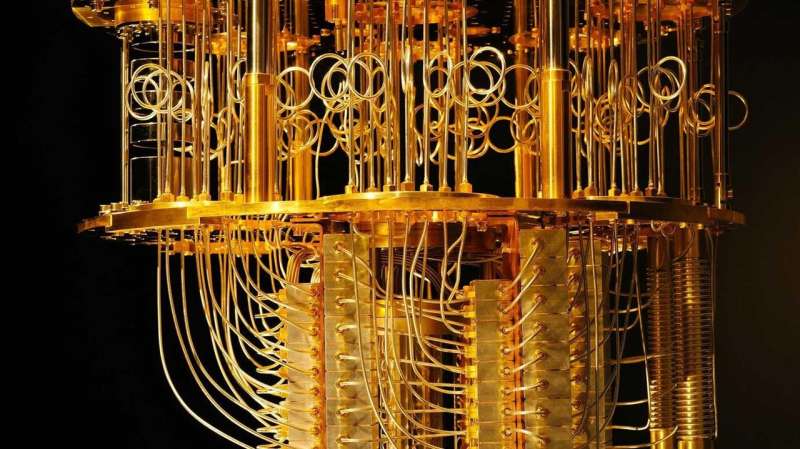
For humans, history noise is normally just a slight irritant. But for quantum computer systems, which are quite delicate, it can be a demise knell for computations. And simply because “sounds” for a quantum computer increases as the pc is tasked with additional advanced calculations, it can immediately become a key obstacle.
But because quantum computers could be so exceptionally beneficial, researchers have been experimenting with techniques to get about the sounds challenge. Typically, they consider to evaluate the sound in purchase to appropriate for it, with mixed achievements.
A group of experts from the College of Chicago and Purdue College collaborated on a new approach: As a substitute of instantly making an attempt to measure the noise, they alternatively build a unique “fingerprint” of the sound on a quantum laptop as it is seen by a plan operate on the laptop or computer.
This technique, they say, reveals assure for mitigating the sounds problem—as well as suggesting methods that users could actually convert sounds to their benefit.
“We wondered if there was a way to operate with the sounds, as an alternative of towards it,” stated David Mazziotti, professor in the Division of Chemistry, James Franck Institute and the Chicago Quantum Trade and a co-creator on the examine, which was printed Jan. 25 in Character Communications Physics.
‘A fresh approach’
Quantum pcs are based on the rules of how particles behave at the atomic degree. Down at that level, particles obey a established of really unusual policies they can be in two distinctive states at the moment, or turn out to be ‘entangled’ throughout room. Researchers hope to harness these qualities as the foundation for computers.
In specific, lots of scientists want to use quantum computers to far better understand the policies of the purely natural globe, for the reason that molecules work according to the laws of quantum mechanics—which should really theoretically be a lot easier to simulate applying a quantum pc.
But in spite of major improvements in quantum computing know-how about the previous decade, computational potential has lagged driving scientists’ hopes. Several experienced assumed that expanding the selection of computer bits—”qubits,” for quantum computers—would help ease the noise difficulty, but due to the fact sound restrictions precision, scientists still haven’t been capable to complete many of the computations they would like.
“We thought it may well be time for a contemporary solution,” mentioned co-writer Sabre Kais, professor of physics and chemistry at Purdue University.
To day, researchers have tried using to fully grasp the influence of sounds by specifically measuring the noise in every qubit. But cataloging these discrete improvements is hard, and, the team believed, most likely not usually the most productive route.
“Rather frequently in physics, it is really a lot easier to recognize the in general actions of a procedure than to know what each and every part is carrying out,” claimed co-creator Zixuan Hu, a postdoctoral researcher at Purdue. “For illustration, it is tough to simulate what each molecule in a glass of h2o is performing, but it is a great deal easier to predict the actions of the total.”
So instead of making an attempt to exactly measure the precise sound, the researchers made the decision to run a test to get a feeling of the total sound that quantum personal computers knowledge.
They picked a unique computation of a molecule exhibiting quantum conduct, and ran it as a simulation on a quantum laptop or computer. Then they tweaked the options on the dilemma in a number of diverse instructions, and saved track of how the sound responded. “By placing this all alongside one another, we develop a ‘fingerprint’ of the sounds as perceived by the simulation that we’re jogging,” stated Mazziotti.
Hu discussed that working a computation of a molecule that is presently very well known served them tease out the certain consequences of the noise.
“We know quite tiny about quantum computer systems and sounds, but we know seriously nicely how this molecule behaves when enthusiastic,” claimed Hu. “So we use quantum desktops, which we will not know significantly about, to mimic a molecule which we are familiar with, and we see how it behaves. With those people common designs we can draw some knowing.”
This operation gives a far more ‘bird’s-eye’ look at of the sounds that quantum pcs simulate, mentioned Scott Sensible, a Ph.D. student at the College of Chicago and first creator on the paper.
The authors hope this details can assistance scientists as they feel about how to design and style new strategies to right for sounds. It could even suggest strategies that noise could be helpful, Mazziotti explained.
For case in point, if you’re hoping to simulate a quantum procedure this sort of as a molecule in the real planet, you know it will be suffering from noise—because sound exists in the actual planet. Underneath the former technique, you use computational energy to add a simulation ofthat sound.
“But as an alternative of building sounds in as additional operation on a quantum laptop or computer, perhaps we could really use the sounds intrinsic to a quantum computer to mimic the sounds in a quantum issue that is tough to resolve on a typical pc,” Mazziotti reported.
The authors imagine this exceptional approach to the sounds issue is useful as researchers continue on to discover the young field of quantum computing.
“We are continue to not even positive what types of troubles for which quantum pcs will be most beneficial,” Mazziotti reported. “We hope this will offer different way to imagine about noise that will open up new avenues for simulating molecules with quantum devices.”
Researchers acquire 1st quantum algorithm to characterize noise throughout large programs
Scott E. Wise et al, Leisure of stationary states on a quantum pc yields a exclusive spectroscopic fingerprint of the computer’s sound, Communications Physics (2022). DOI: 10.1038/s42005-022-00803-8
Citation:
Scientists simulate ‘fingerprint’ of noise on quantum laptop (2022, January 26)
retrieved 27 January 2022
from https://phys.org/information/2022-01-experts-simulate-fingerprint-noise-quantum.html
This document is issue to copyright. Aside from any reasonable working for the reason of personal examine or analysis, no
element could be reproduced without the need of the created permission. The information is delivered for info applications only.






